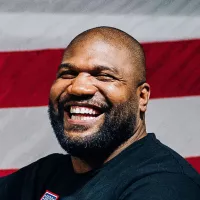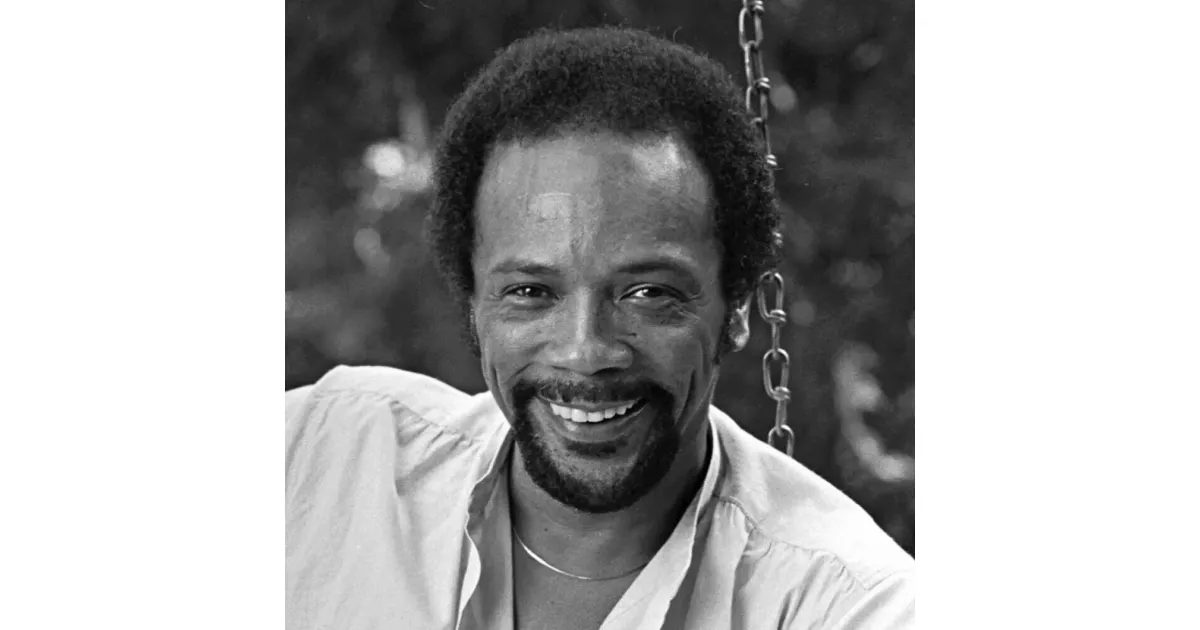Quincy Jones is a highly acclaimed American record producer, composer, arranger, conductor, trumpeter, and bandleader with a career spanning seven decades. He's garnered significant recognition, including 28 Grammy Awards, a Primetime Emmy Award, and a Tony Award. Furthermore, he has been nominated for seven Academy Awards and four Golden Globe Awards, solidifying his impact and contribution to the music and entertainment industry.
1904: Birth of Sara Frances Wells
In 1904, Sara Frances Wells, Quincy Jones's mother, was born.
1943: Family Moved to Bremerton, Washington
In 1943, Quincy Jones's family relocated to Sinclair Park in Bremerton, Washington, where his father took a wartime job at the Puget Sound Naval Shipyard.
1953: European Tour with Lionel Hampton
In 1953, at the age of 20, Quincy Jones toured Europe with jazz bandleader Lionel Hampton, an experience that broadened his perspective on racism and global conflicts.
1954: Settled in New York
After leaving the Hampton band in 1954, Quincy Jones settled in New York and began writing music professionally.
1956: CBS' Stage Show with Elvis Presley
In early 1956, Quincy Jones played second trumpet in the studio band that supported Elvis Presley in his first six television appearances on CBS' Stage Show.
1957: Married Jeri Caldwell
In 1957, Quincy Jones married Jeri Caldwell, with whom he had a daughter named Jolie.
1957: Moved to Paris
In 1957, Quincy Jones moved to Paris to study composition and theory and became music director at Barclay, a French record company.
1958: First collaboration with Frank Sinatra
In 1958, Quincy Jones first worked with Frank Sinatra when invited by Princess Grace to arrange a benefit concert at the Monaco Sporting Club.
1961: Vice-President of Mercury Records
In 1961, Quincy Jones was promoted to Vice-President of Mercury Records, becoming the first African American to hold that position.
1962: "Soul Bossa Nova" tune originated
In 1962, Quincy Jones's tune "Soul Bossa Nova" originated on the Big Band Bossa Nova album.
1963: Produced "It's My Party" and "She's a Fool"
In 1963, Quincy Jones produced Lesley Gore's hit singles "It's My Party" and "She's a Fool", contributing to her early success.
1964: Arranged and conducted 'It Might as Well Be Swing'
In 1964, Quincy Jones arranged and conducted Frank Sinatra's second album with Count Basie, 'It Might as Well Be Swing'.
1964: Composed music for 'The Pawnbroker'
In 1964, Quincy Jones composed music for 'The Pawnbroker' at the invitation of director Sidney Lumet, marking his entry into major motion picture scores.
1964: Produced "Judy's Turn to Cry" and "You Don't Own Me"
In 1964, Quincy Jones produced Lesley Gore's "Judy's Turn to Cry" and "You Don't Own Me", which became notable hits.
June 1965: Sinatra, Sammy Davis Jr., Dean Martin, and Johnny Carson performed with Basie orchestra in St. Louis
In June 1965, Jones was the arranger/conductor when Sinatra, Sammy Davis Jr., Dean Martin, and Johnny Carson performed with the Basie orchestra in St. Louis.
October 16, 1965: Sinatra and Basie on 'The Hollywood Palace'
On October 16, 1965, Quincy Jones was the arranger/conductor when Frank Sinatra and Count Basie appeared on 'The Hollywood Palace' TV show.
1965: Composed film score for 'The Pawnbroker'
In 1965, Quincy Jones composed the film score for 'The Pawnbroker', marking the first of nearly 40 major motion picture scores.
1965: Produced "Look of Love", "Maybe I Know", "Sunshine, Lollipops And Rainbows", and "My Town, My Guy And Me"
In 1965, Quincy Jones produced several more notable hits for Lesley Gore, including "Look of Love", "Maybe I Know", "Sunshine, Lollipops And Rainbows", and "My Town, My Guy And Me".
1965: Composing film scores for Mirage and The Slender Thread
In 1965, following the success of 'The Pawnbroker', Quincy Jones composed film scores for 'Mirage' and 'The Slender Thread', leading to high demand as a composer.
1966: Conducted and arranged 'Sinatra at the Sands'
In 1966, Quincy Jones conducted and arranged Frank Sinatra's live album with the Basie Band, 'Sinatra at the Sands'.
1966: Divorced Jeri Caldwell
In 1966, Quincy Jones divorced Jeri Caldwell.
1966: Continued to produce for Lesley Gore
Quincy Jones continued to produce for Lesley Gore until 1966, marking the end of a successful collaboration.
1967: Composed film scores for 'In the Heat of the Night' and 'In Cold Blood'
In 1967, Quincy Jones composed the film scores for both 'In the Heat of the Night' and 'In Cold Blood', further establishing his career as a composer.
1967: Married Ulla Andersson
In 1967, Quincy Jones married Swedish actress Ulla Andersson, with whom he had a daughter named Martina and a son named Quincy.
1967: Nominated for Academy Award for Best Original Score
In 1967, Quincy Jones was nominated for an Academy Award for Best Original Score for In Cold Blood, making him the first African American to be nominated twice in the same year.
1968: First Academy Award Nomination for Best Original Song
In 1968, Quincy Jones became the first African American to be nominated for an Academy Award for Best Original Song for "The Eyes of Love".
1969: Composed film score for 'The Italian Job'
In 1969, Quincy Jones composed the film score for 'The Italian Job', contributing to another notable film.
1971: Death of Quincy Delight Jones Sr.
In 1971, Quincy Delight Jones Sr., Quincy Jones's father, passed away.
1971: First African American musical director and conductor of the Academy Awards
In 1971, Quincy Jones became the first African American to be the musical director and conductor of the Academy Awards.
1974: Develops brain aneurysm and attends his own memorial service
In 1974, Quincy Jones developed a life-threatening brain aneurysm and, as his family planned a memorial service, he attended it with his neurologist.
1974: Divorced Ulla Andersson
In 1974, Quincy Jones divorced Ulla Andersson.
1975: Founded Qwest Productions and Reunited with Lesley Gore
In 1975, Quincy Jones founded Qwest Productions and reunited with Lesley Gore, producing her critically acclaimed album Love Me By Name.
1977: Primetime Emmy Award for 'Roots'
In 1977, Quincy Jones won the Primetime Emmy Award for Outstanding Music Composition for a Series for the miniseries 'Roots'.
1978: Composed film score for 'The Wiz'
In 1978, Quincy Jones composed the film score for 'The Wiz', a musical adaptation of The Wizard of Oz.
1978: Produced 'The Wiz' Soundtrack
In 1978, Quincy Jones produced the soundtrack for 'The Wiz', starring Michael Jackson and Diana Ross, leading to his collaboration with Michael Jackson on his solo album.
1979: Production of "Off the Wall"
In 1979, Quincy Jones produced Michael Jackson's album "Off the Wall", marking a significant milestone in both of their careers.
1981: Release of album 'The Dude'
In 1981, Quincy Jones released his album 'The Dude', which featured hits such as 'Ai No Corrida', 'Just Once', and 'One Hundred Ways'.
1982: Production of "Thriller"
In 1982, Quincy Jones produced Michael Jackson's album "Thriller", which became the highest-selling album of all time.
1984: Teamed up for 'L.A. Is My Lady'
In 1984, Frank Sinatra and Quincy Jones teamed up for the album 'L.A. Is My Lady'.
1985: Recorded 'We Are the World'
After the 1985 American Music Awards, Quincy Jones gathered major recording artists to record 'We Are the World' for famine relief in Ethiopia.
1985: Composed film score for 'The Color Purple'
In 1985, Quincy Jones composed the film score for 'The Color Purple', adding to his repertoire of film scores.
1985: Film producer for 'The Color Purple'
In 1985, Quincy Jones debuted as a film producer with 'The Color Purple', which received 11 Oscar nominations.
1986: Started Qwest Entertainment
In 1986, Quincy Jones started Qwest Entertainment to produce films and manage his media ventures, including Qwest Records and Qwest Music Publishing.
1987: Production of "Bad"
In 1987, Quincy Jones produced Michael Jackson's album "Bad", which sold 45 million copies, concluding their collaborations.
February 10, 1990: Hosts Saturday Night Live
On February 10, 1990, Quincy Jones hosted an episode of Saturday Night Live with a record-breaking 10 musical guests and impersonated Marion Barry in a sketch.
1990: Created Quincy Jones Entertainment (QJE)
In 1990, Quincy Jones Productions joined with Time Warner to create Quincy Jones Entertainment (QJE), signing deals with Warner Bros. and NBC Productions.
1991: Dates Nastassja Kinski
In 1991, Quincy Jones began dating and living with German actress Nastassja Kinski.
1991: Miles Davis agrees to perform at Montreux Jazz Festival
In 1991, despite suffering from pneumonia, Miles Davis relented to Quincy Jones' long-term persuasion and agreed to perform Gil Evans' arrangements at the Montreux Jazz Festival, resulting in his last album, Miles & Quincy Live at Montreux.
1992: Grammy Legend Award
In 1992, Quincy Jones received the Grammy Legend Award, acknowledging his significant impact on the music industry.
1993: Produces An American Reunion
In 1993, Quincy Jones collaborated with David Salzman to produce the concert An American Reunion, celebrating Bill Clinton's inauguration, and renamed his company to Quincy Jones/David Salzman Entertainment.
1994: Produced 'The Jenny Jones Show'
In 1994, Quincy Jones Entertainment began producing the first-run syndication of 'The Jenny Jones Show'.
1994: Tupac Shakur criticizes Jones' relationships
In 1994, Tupac Shakur criticized Quincy Jones for having relationships with white women, leading to a response from Jones' daughter Rashida.
1995: Produces Mad TV
In 1995, Jones began producing his own sketch comedy show, FOX's Mad TV, which ran for many years.
1995: Receives Jean Hersholt Humanitarian Award
In 1995, Quincy Jones became the first African American to receive the academy's Jean Hersholt Humanitarian Award.
1995: Ends relationship with Nastassja Kinski
In 1995, Quincy Jones ended his relationship with Nastassja Kinski.
1995: 'In the House' aired on NBC and UPN
In 1995, the television show 'In the House', produced by Quincy Jones Entertainment, began airing on NBC and UPN, continuing until 1999.
1997: Produced 'The Jenny Jones Show' until 1997
In 1997, Quincy Jones Entertainment ended its production of the first-run syndication of 'The Jenny Jones Show'.
1997: "Soul Bossa Nova" used in Austin Powers
In 1997, Quincy Jones's 1962 tune "Soul Bossa Nova" was used as the theme for the spy comedy Austin Powers: International Man of Mystery.
1998: Death of Lloyd Jones
In 1998, Lloyd Jones, Quincy Jones's younger brother and an engineer for KOMO-TV, passed away.
1999: Appears in Fantasia 2000
In 1999, Quincy Jones appeared in Walt Disney Pictures' animated film Fantasia 2000, introducing George Gershwin's Rhapsody in Blue.
1999: Death of Sara Frances Wells
In 1999, Sara Frances Wells, Quincy Jones's mother, passed away.
2000: Fantasia 2000 Released
In 2000, Quincy Jones appeared in Walt Disney Pictures' animated film Fantasia 2000, introducing George Gershwin's Rhapsody in Blue.
2001: Becomes honorary member of the board of directors of the Jazz Foundation of America
In 2001, Quincy Jones became an honorary member of the board of directors of the Jazz Foundation of America and worked to support elderly jazz and blues musicians.
2001: Publishes Autobiography
In 2001, Quincy Jones published his autobiography Q: The Autobiography of Quincy Jones.
2001: Kennedy Center Honors
In 2001, Quincy Jones received the Kennedy Center Honors, celebrating his lifetime contributions to American culture.
2001: Audio interviews included in special editions
In 2001, audio interviews with Quincy Jones were included in the special editions of Michael Jackson's 'Off the Wall', 'Thriller', and 'Bad' albums.
2002: Cameo in Austin Powers in Goldmember
In 2002, Quincy Jones made a cameo appearance as himself in the film Austin Powers in Goldmember.
2002: Michael Jackson considers working with Jones again
In a 2002 interview, Michael Jackson suggested he might work with Quincy Jones again.
2004: Helps launch We Are the Future project
In 2004, Quincy Jones helped launch the We Are the Future (WAF) project, providing opportunities for children in impoverished and conflict-ridden areas.
2006: Genealogical Research for African American Lives
In 2006, Quincy Jones participated in the PBS program African American Lives, undergoing DNA testing and genealogical research to explore his family history and ancestry.
July 2007: Endorses Hillary Clinton for president
In July 2007, Quincy Jones announced his endorsement of Hillary Clinton for president and advocated for a secretary of arts.
July 2007: Starts Quincy Jones Video Podcast
In July 2007, Quincy Jones partnered with Wizzard Media to start the Quincy Jones Video Podcast, sharing his music industry knowledge and experience.
2007: Jones declines to work with Michael Jackson
In 2007, Quincy Jones stated he was too busy to work with Michael Jackson again.
February 10, 2008: Presents Grammy Award
On February 10, 2008, Quincy Jones joined Usher in presenting the Grammy Award for Album of the Year to Herbie Hancock.
January 6, 2009: Appears on Last Call with Carson Daly
On January 6, 2009, Quincy Jones appeared on NBC's Last Call with Carson Daly, where the idea of him becoming the first minister of culture for the United States was discussed.
June 25, 2009: Mourns Michael Jackson's Death
On June 25, 2009, Quincy Jones expressed his devastation at the sudden death of Michael Jackson, reflecting on their collaborative work and Jackson's legacy.
2009: Produces Anita Hall's Album
In 2009, Quincy Jones helped produce Anita Hall's album Send Love.
2009: Mad TV ends
In 2009, the sketch comedy show Mad TV, which Jones produced, ended.
2010: Co-founds Playground Sessions
In 2010, Quincy Jones co-founded Playground Sessions, a software developer that teaches piano through interactive videos, with Chris Vance.
2011: National Medal of the Arts
In 2011, Quincy Jones was awarded the National Medal of the Arts, recognizing his profound impact on the arts.
October 2013: Plans to sue Michael Jackson's estate
In October 2013, Quincy Jones planned to sue Michael Jackson's estate for $10 million over royalties and production fees.
2013: Produces Emily Bear's album Diversity
In 2013, Quincy Jones produced Emily Bear's album Diversity.
February 2014: Appears in Keep on Keepin' On documentary
In February 2014, Quincy Jones appeared in the documentary Keep on Keepin' On, where Clark Terry introduced him to Justin Kauflin, whom Jones later signed.
July 2014: Stars in The Distortion of Sound documentary
In July 2014, Quincy Jones starred in a documentary film called The Distortion of Sound.
2014: Ordre des Arts et des Lettres
In 2014, Quincy Jones was honored with the Ordre des Arts et des Lettres, a French award recognizing significant contributions to the arts.
February 28, 2016: Presents Oscar to Ennio Morricone
On February 28, 2016, Quincy Jones and Pharrell Williams presented Ennio Morricone with the Oscar for Best Original Score.
August 2016: Featured at BBC Proms
In August 2016, Quincy Jones and his music were featured at the BBC Proms in the Royal Albert Hall, London.
2016: Tony Award for 'The Color Purple' Revival
In 2016, Quincy Jones received a Tony Award for Best Revival of a Musical as a producer for the revival of 'The Color Purple'.
2017: Starts Qwest TV
In 2017, Quincy Jones and Reza Ackbaraly started Qwest TV, a subscription video-on-demand service for jazz and eclectic music.
February 2018: Jones makes controversial statements
In February 2018, Quincy Jones made controversial statements regarding religion, the Kennedy assassination, and Marlon Brando's sexuality.
March 20, 2020: Appears in Travis Scott and Young Thug music video
On March 20, 2020, Quincy Jones appeared in a music video by Travis Scott and Young Thug for the song "Out West".
January 2022: Performs monologue on The Weeknd's album
In January 2022, Quincy Jones appeared on The Weeknd's album Dawn FM, performing a monologue.
June 2024: Academy Honorary Award
In June 2024, Quincy Jones received the Academy Honorary Award, celebrating his extraordinary achievements in film.
November 3, 2024: Quincy Jones's Death
On November 3, 2024, Quincy Jones passed away, marking the end of a seven-decade career filled with numerous accolades and contributions to the music industry.
Mentioned in this timeline

Travis Scott Jacques Bermon Webster II is a highly successful...

Tupac Shakur also known as Pac and Makaveli was a...

Bill Clinton the nd U S President - served as...

Michael Joseph Jackson the King of Pop was a highly...

Abel Makkonen Tesfaye known as The Weeknd is a Canadian...

Hillary Diane Rodham Clinton is a prominent American politician lawyer...
Trending

24 hours ago Magda Linette Advances to WTA Dubaj Round 2, Fr?ch Eliminated, Other Final Matches

47 minutes ago Larry Wheels Slaps DeenTheGreat for Flirting with Wife on Rampage Jackson's Stream.

47 minutes ago Centreville Home Explosion: Gas Leak Source Remains Unknown After Two Days of Investigation

3 months ago Anisimova at WTA Finals: Semifinal showdown against Sabalenka, Rybakina advances to the final.

48 minutes ago Clara Tauson advances in Dubai, defeating Stearns and facing Linette next.

2 hours ago Selena Gomez and Benny Blanco celebrate Valentine's Day, sparking fan discussions and admiration.
Popular

Jesse Jackson is an American civil rights activist politician and...
Randall Adam Fine is an American politician a Republican who...

Pam Bondi is an American attorney lobbyist and politician currently...

Barack Obama the th U S President - was the...

Kid Rock born Robert James Ritchie is an American musician...

XXXTentacion born Jahseh Dwayne Ricardo Onfroy was a controversial yet...
